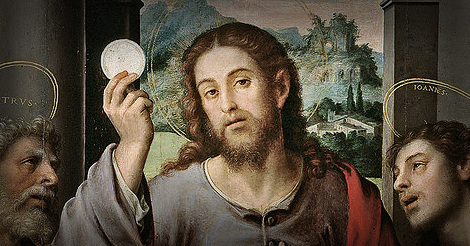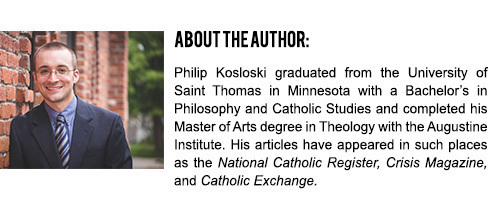|
Last week we learned how the Eucharist is not a “what” but a “who;” Jesus Himself, truly present under the appearances of bread. But how is that possible?
First of all, let us remind ourselves of Jesus’ affirmation of His presence in the Eucharist in the Gospel of John, chapter 6: “‘I am the bread of life. Your fathers ate the manna in the wilderness, and they died. This is the bread which comes down from heaven, that a man may eat of it and not die. I am the living bread which came down from heaven; if any one eats of this bread, he will live for ever; and the bread which I shall give for the life of the world is my flesh.’ The Jews then disputed among themselves, saying, ‘How can this man give us his flesh to eat?’ So Jesus said to them, ‘Truly, truly, I say to you, unless you eat the flesh of the Son of man and drink his blood, you have no life in you; he who eats my flesh and drinks my blood has eternal life, and I will raise him up at the last day. For my flesh is food indeed, and my blood is drink indeed. He who eats my flesh and drinks my blood abides in me, and I in him. As the living Father sent me, and I live because of the Father, so he who eats me will live because of me’” (John 6:48-57).Jesus said clearly in this passage that He is the bread of life and that we must eat His flesh in order to have life. It is at the Last Supper that these words find their fulfillment when Jesus holds up the bread and wine and says “This is my body…this is my blood.” It is clear as well that Jesus’ followers did commit cannibalism while Jesus was on earth and did not feast on his dead body. Instead, they continued on what Jesus instructed them to do; to “do this in memory of me.” It is in the celebration of the Eucharist that the Apostles believed they could fulfill Jesus’ words to “eat my flesh and drink my blood.” This means that the Eucharist is the body and blood of Christ precisely because that is what He wanted. Jesus desired that all may have life in Him and so left us His abiding presence in the Eucharist to grant us life. Secondly, this transformation is possible because Jesus is God and He who created the world of out nothing can certainly create something out of something. Or as Saint Ambrose put it: “Be convinced that this is not what nature has formed, but what the blessing has consecrated. The power of the blessing prevails over that of nature, because by the blessing nature itself is changed… . Could not Christ’s word, which can make from nothing what did not exist, change existing things into what they were not before? It is no less a feat to give things their original nature than to change their nature.” Third, Jesus is present in the Eucharist by way of transubstantiation: Catechism of the Catholic Church 1376 The Council of Trent summarizes the Catholic faith by declaring: “Because Christ our Redeemer said that it was truly his body that he was offering under the species of bread, it has always been the conviction of the Church of God, and this holy Council now declares again, that by the consecration of the bread and wine there takes place a change of the whole substance of the bread into the substance of the body of Christ our Lord and of the whole substance of the wine into the substance of his blood. This change the holy Catholic Church has fittingly and properly called transubstantiation.” 1377 The Eucharistic presence of Christ begins at the moment of the consecration and endures as long as the Eucharistic species subsist. Christ is present whole and entire in each of the species and whole and entire in each of their parts, in such a way that the breaking of the bread does not divide Christ. To put it in similar terms, the appearances of bread remain, but what the bread is, becomes Jesus Himself. By way of analogy, water is known scientifically as h2O and remains that way whether it is ice, water or steam. In this example the outward appearances change, but the essence of what it is, remains. When it comes to the Eucharist, it is the reverse. The outward appearances do not change while the essence of what it is, changes. The Eucharist is a great mystery, one that we will not fully understand here on earth. However, we have the assurance of the Holy Spirit that this indeed happens and on occasion it is confirmed through Eucharistic miracles, when the outward appears actually change and the Host becomes the blood of Christ. In the end, we must pray the words of the father, whose boy was healed by Jesus, "I believe, help my unbelief!" (Mark 9:24) Read the Entire Series
0 Comments
Your comment will be posted after it is approved.
Leave a Reply. |
MASS SCHEDULE
Tuesday - Friday: 8:00 AM Saturday: 4:00 PM Sunday: 8:00 AM & 10:00 AM RECONCILIATION
Saturday: 3:15 - 3:45 PM OFFICE HOURS
Monday - Thursday: 8:30 AM – 5:00 PM Friday: 8:30 AM – 12:30 PM Stay Connected with Our ParishWelcome from Our PastorWelcome to Christ the King Catholic Church! Ever since 1938 this parish has been assisting souls in their quest for deeper union with God. Our mission statement is essentially found in the stained glass window above the main altar: “For Christ our King.” Insofar as God made us and we belong to Him, we have come to... Read More
Archives
February 2021
Categories
All
|
Copyright © 2024 Christ the King Parish. All Rights Reserved.
Mailing address: 306 S. LaSalle St, Spencer, WI 54479
(715) 659-4480




 RSS Feed
RSS Feed